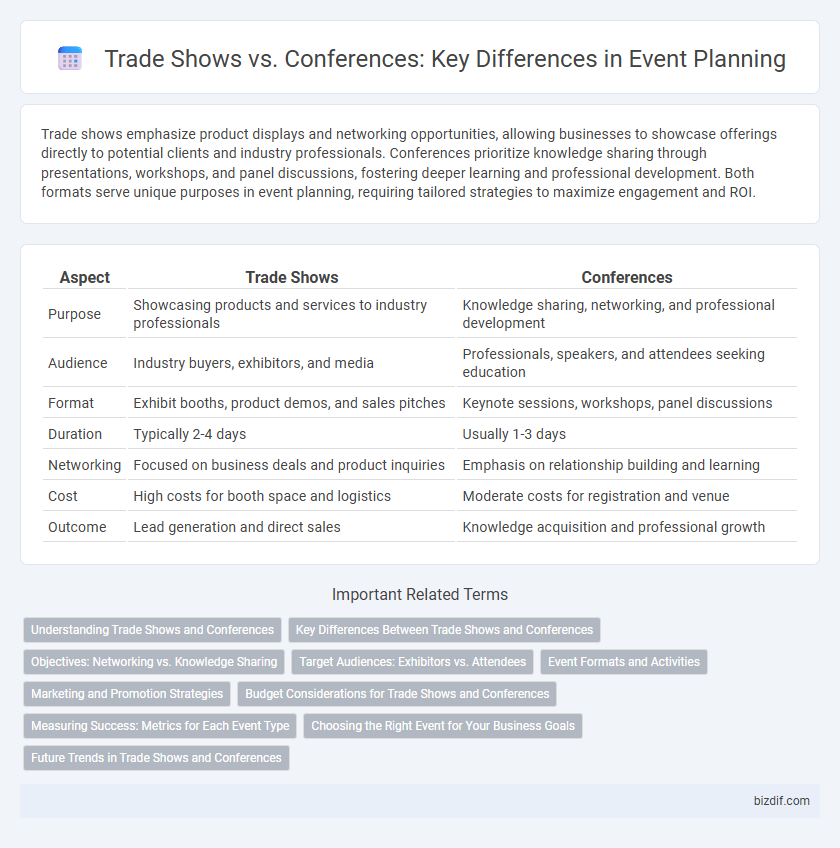Trade shows emphasize product displays and networking opportunities, allowing businesses to showcase offerings directly to potential clients and industry professionals. Conferences prioritize knowledge sharing through presentations, workshops, and panel discussions, fostering deeper learning and professional development. Both formats serve unique purposes in event planning, requiring tailored strategies to maximize engagement and ROI.
Table of Comparison
| Aspect | Trade Shows | Conferences |
|---|---|---|
| Purpose | Showcasing products and services to industry professionals | Knowledge sharing, networking, and professional development |
| Audience | Industry buyers, exhibitors, and media | Professionals, speakers, and attendees seeking education |
| Format | Exhibit booths, product demos, and sales pitches | Keynote sessions, workshops, panel discussions |
| Duration | Typically 2-4 days | Usually 1-3 days |
| Networking | Focused on business deals and product inquiries | Emphasis on relationship building and learning |
| Cost | High costs for booth space and logistics | Moderate costs for registration and venue |
| Outcome | Lead generation and direct sales | Knowledge acquisition and professional growth |
Understanding Trade Shows and Conferences
Trade shows are industry-specific events focused on product exhibitions, networking, and generating sales leads, attracting vendors and buyers for direct business interactions. Conferences center on knowledge sharing through presentations, panel discussions, and workshops, designed for professional development and thought leadership within a field. Both event types serve distinct purposes, with trade shows driving commerce and conferences emphasizing education and collaboration.
Key Differences Between Trade Shows and Conferences
Trade shows primarily focus on showcasing products and services through exhibitor booths, attracting industry professionals and buyers for networking and sales opportunities. Conferences emphasize educational sessions, keynote speakers, and workshops designed to share knowledge and foster professional development. While trade shows prioritize visual product displays and business transactions, conferences concentrate on thought leadership and collaborative learning experiences.
Objectives: Networking vs. Knowledge Sharing
Trade shows primarily focus on facilitating networking opportunities among industry professionals, exhibitors, and potential clients to build business relationships and generate leads. Conferences emphasize knowledge sharing through presentations, workshops, and panel discussions designed to update attendees on industry trends and innovations. Both event types serve distinct objectives that cater to different professional goals within the event planning industry.
Target Audiences: Exhibitors vs. Attendees
Trade shows primarily target exhibitors seeking to showcase products and services to potential buyers, industry partners, and media representatives, creating a dynamic platform for business promotion and networking. Conferences attract attendees interested in acquiring knowledge, professional development, and industry insights through keynote speakers, workshops, and panel discussions. Understanding these distinct target audiences helps event planners tailor content, marketing strategies, and logistics to maximize engagement and return on investment.
Event Formats and Activities
Trade shows emphasize exhibitor booths, product demonstrations, and networking opportunities designed for industry professionals to showcase innovations and engage potential clients. Conferences prioritize educational sessions, keynote speeches, panel discussions, and workshops aimed at knowledge sharing and professional development within specific fields. Both formats incorporate social gatherings and interactive activities but differ in their primary focus--trade shows on commercial engagement and conferences on information exchange.
Marketing and Promotion Strategies
Trade shows generate higher brand visibility through interactive product demonstrations and direct customer engagement, leveraging booth designs and giveaways to attract leads. Conferences emphasize thought leadership and content-driven marketing by featuring expert speakers, panel discussions, and networking sessions to build credibility and nurture industry relationships. Effective promotion strategies combine targeted email campaigns, social media advertising, and influencer partnerships to maximize attendance and amplify event impact.
Budget Considerations for Trade Shows and Conferences
Trade shows often require higher budgets due to booth rentals, design, shipping, and onsite staff expenses compared to conferences, which typically focus on speaker fees, venue rental, and attendee accommodations. Allocating funds for promotional materials and lead capture technology is crucial at trade shows to maximize return on investment, whereas conferences demand budget prioritization for keynote speakers and networking events. Understanding these financial differences supports strategic decision-making to optimize marketing outcomes and attendee engagement.
Measuring Success: Metrics for Each Event Type
Trade shows measure success primarily through lead generation, booth traffic, and immediate sales conversions, reflecting direct ROI. Conferences focus on attendee engagement, session feedback, and post-event surveys to gauge knowledge transfer and networking impact. Both event types benefit from tracking social media mentions and brand exposure to assess broader market influence.
Choosing the Right Event for Your Business Goals
Trade shows provide direct access to industry-specific buyers and hands-on product demonstrations, making them ideal for businesses focused on lead generation and immediate sales impact. Conferences emphasize thought leadership, networking opportunities, and educational sessions, which benefit companies aiming to build brand authority and foster long-term relationships. Selecting between trade shows and conferences depends on targeting measurable outcomes such as high-volume client acquisition or strategic industry positioning aligned with business objectives.
Future Trends in Trade Shows and Conferences
Future trends in trade shows emphasize hybrid formats combining in-person and virtual experiences to enhance attendee engagement and broaden global reach. Conferences increasingly leverage AI-driven personalization and data analytics to tailor content and networking opportunities, improving participant satisfaction and ROI. Both event types are adopting sustainable practices and immersive technologies like AR/VR to create interactive and eco-friendly environments.
Trade shows vs Conferences Infographic

 bizdif.com
bizdif.com